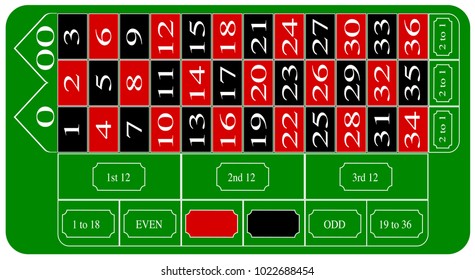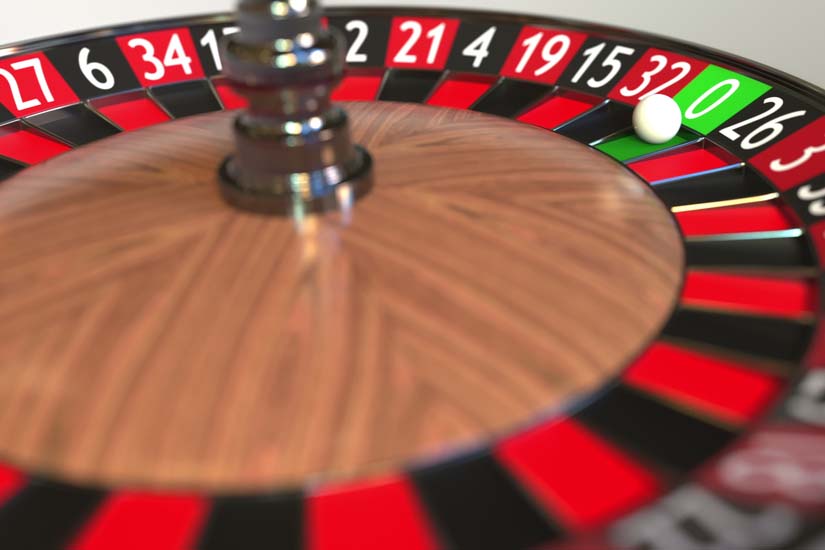Roulette Double Up
To double up with this wager, you’ll need to see a two or three show up on the come out roll, or land a seven before the point number is hit again. There’s a lot of moving parts there, making the math a bit. The Roulette Double Up. So this strategy can be quite Roulette Casino Fabrication rewarding, but at the same time risky. Whenever you claim a casino bonus, the first thing you should do is to take the whole amount and bet on either RED or BLACK on Roulette. This page focuses on the American (double zero) roulette game. First up, the differences between American roulette and the other versions are detailed, before discussing the house edge. Next the online version of the game available at real money casinos in NJ, PA and elsewhere is covered. This page ends with a look at roulette strategy and some. The martingale is the strategy that comes up the most when it comes to using a basic mathematical strategy in different casino games. In this case, it is roulette and the use of the Double Up roulette strategy, which allows you to redo in case of bet or losing game. If you want, Double Up is the English term attributed to martingale.
Home- Strategy- Probability- Analysis- Test- Quiz System- Buy- Contact About
award winner
Which outcome has a higher probability after eight successive Blacks, Black again or Red? By Jacob Kanzen
Probability, the Martingale system and the 'delayed' double-up betting strategy.
At roulette each spin is a new spin and the outcome is never determined by prior spins. After eight successive blacks, a black is as likely to come up as a red. You may argue that the reds and blacks will eventually even out over a long run, and you would be right. Indeed, we are both right.
Let's first analyse why the odds are the same each spin of the wheel even if the outcomes even out over a long run, and then we'll look at the popular 'delayed' double up betting strategy, based on the Martingale system, that has an apparent probability advantage employed by most beginners. In order to simplify the calculations, we will assume that the roulette wheel has no zeros, just 18 red and 18 black slots.
Consider this:
In, say, 1,000,000 roulette spins you would have in theory 500,000 reds and 500,000 blacks appearing. Now, we know they don't come up in turns one at a time, that is, you would expect to see two, three, four or more in a row in either colour to appear. For this analysis we will consider the 'eight blacks in a row sequence' as the typical example.
If you were to count all the occurrences of eight blacks in a row FOLLOWED BY A RED, you will find an equal number of occurrences of eight blacks in a row FOLLOWED BY A BLACK (9+ blacks in a row). You will also find an equal number of eight reds in a row in the same way making the total number of blacks and reds equal. If you have a computer roulette simulator, try it out.
This means that of the 'eight blacks' sets there are 50% eight blacks in a row FOLLOWED BY A RED and 50% eight blacks in a row FOLLOWED BY A BLACK. The same applies to the 'eight reds' sets. Therefore if you bet red after eight blacks in a row or if you bet black after eight reds in a row, you will have a 50:50 chance of getting it right.
This is true no matter how many times black or red come up in a row, because for every occurrence of, say, 8, 10 or 20 blacks in a row FOLLOWED BY A RED there will be one with 8, 10 or 20 blacks in a row FOLLOWED BY A BLACK. You just don't know which of the two sequences will come up first.
After eight blacks in a row, your chances of winning are still 50:50 whether you bet on red or black.
Tip: If you are influenced by previous results, then learn to bet with the outcome and not against it. You will eventually realize that it makes no difference. If anything, the 'law of unequal distribution' will be on your side.
The 'delayed' double up betting strategy:
It is a known fact that many players wait for, say, four blacks in a row to appear and then start betting on red doubling up the bet up to four times (or more) if they lose. They do this believing that they have gained a sequential probability advantage - the four successive blacks with no bet. Indeed if you use this strategy, you will win most of the time and you will probably conclude that you have an advantage.
You would be wrong! Take a look at the following figures:

Roulette Double Up Strategy
Starting with one chip, if you double up your bet up to four times on red and win, you would win one chip. If you lose on your fourth doubling up bet, you would lose 15 chips (1 + 2 + 4 + 8 = 15). All it takes is one in 16 attempts that you lose and you would have lost all your 15 wins.
Now, try the same double up strategy but bet randomly on red and black. That is, ignore what came up, just bet at will - sometimes red sometimes black and on different tables (switch tables). All you know is this: If you lose you will double up your bet, up to four times. On a long run you should get the same results as your planned one-colour one-table double up betting strategy.
The reason is that it is not the probability of colour that is at work, it is the probability of losing four times in a row on a 50:50 chance bet, which is 1/2 x 1/2 x 1/2 x 1/2 = 1/16. You would in fact in the long run win 15 times and lose one time every 16 attempts, on average. Net profit = 0.
The Martingale system is in fact based on the probability of losing infinite times in a row.
Although infallible in theory, the Martingale system when applied at roulette on the 'even-money' bets requires a large bankroll (it has been reported that in Casino Monte Carlo, Monaco, red came up 39 times in a row), has a very low return and is a very risky one because of the maximum bet limits imposed by the casinos. If you run out of money or reach the house limit, you can lose a lot with no chance to recover your loss.
Tip: For an efficient betting strategy aim to win more money in fewer winning spins.
Two major factors determine how much you win or lose playing roulette. By managing and controlling these two factors, you can generate an advantage that in the long term can make you a winner and keep you ahead of the casino at all times. Find out what these two factors are and what makes a winning system, in the main strategy page titled Winning at Roulette.
Winning at Roulette
Interesting facts, tips and a system.
Home- Strategy- Probability- Analysis- Test- Quiz System- Buy- Contact About

Rate this page: Roulette Probability Analysis.
Kanzen's roulette strategies info site
Email: admin@kanzen.com (Jacob Kanzen)
URL: http://www.kanzen.com/analysis.html
Double Up Roulette System
Note: This page should show on kanzen.com domain (see the http:// or www. at the top of your browser).
If you are caught inside a 'Frame' of another domain, click here to break out.

Home- Strategy- Probability- Analysis- Test- Quiz System- Buy- Contact About
Roulette Double Up Strategy
Copyright © Jacob Kanzen See copyright notice.